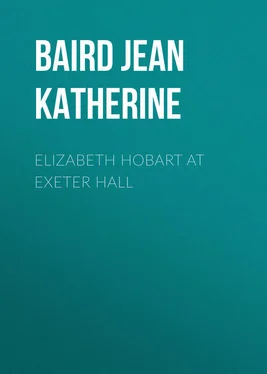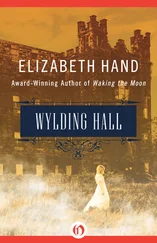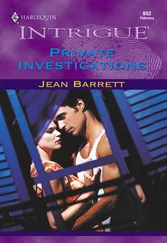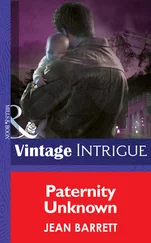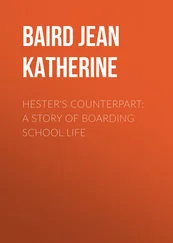Jean Baird - Elizabeth Hobart at Exeter Hall
Здесь есть возможность читать онлайн «Jean Baird - Elizabeth Hobart at Exeter Hall» — ознакомительный отрывок электронной книги совершенно бесплатно, а после прочтения отрывка купить полную версию. В некоторых случаях можно слушать аудио, скачать через торрент в формате fb2 и присутствует краткое содержание. Жанр: foreign_antique, foreign_prose, на английском языке. Описание произведения, (предисловие) а так же отзывы посетителей доступны на портале библиотеки ЛибКат.
- Название:Elizabeth Hobart at Exeter Hall
- Автор:
- Жанр:
- Год:неизвестен
- ISBN:нет данных
- Рейтинг книги:3 / 5. Голосов: 1
-
Избранное:Добавить в избранное
- Отзывы:
-
Ваша оценка:
- 60
- 1
- 2
- 3
- 4
- 5
Elizabeth Hobart at Exeter Hall: краткое содержание, описание и аннотация
Предлагаем к чтению аннотацию, описание, краткое содержание или предисловие (зависит от того, что написал сам автор книги «Elizabeth Hobart at Exeter Hall»). Если вы не нашли необходимую информацию о книге — напишите в комментариях, мы постараемся отыскать её.
Elizabeth Hobart at Exeter Hall — читать онлайн ознакомительный отрывок
Ниже представлен текст книги, разбитый по страницам. Система сохранения места последней прочитанной страницы, позволяет с удобством читать онлайн бесплатно книгу «Elizabeth Hobart at Exeter Hall», без необходимости каждый раз заново искать на чём Вы остановились. Поставьте закладку, и сможете в любой момент перейти на страницу, на которой закончили чтение.
Интервал:
Закладка:
“Oh, you’re a married woman then, and have a family of your own. I was a-thinkin’ just that thing when you picked up little Alec here. You had a knack with him that don’t come to a woman unless she’s used to handling young ones. How many children have you? They’re pretty well grown, I suppose.”
Again Elizabeth caught the merry twinkle of amusement in the woman’s eyes. “Really, you may think it strange,” she replied, “when I declare that I really am not certain how many I have. There are so many that, at times, I almost forget their names. None of them are grown up; for when they are, I lose them. They go off into the world – some do well and some do not. One or two remember me; but the others forget that such a person as I ever lived.” It was not in a complaining tone she spoke, rather in a spirit of light-hearted raillery.
Elizabeth smiled. She understood the speaker, but Mrs. Koons did not. Elizabeth had been accustomed to hear Miss Hale speak thus of her mission boys and girls. Miss Hale looked upon them as a little family of which she was the head.
Mrs. Koons was amazed. She had heard, in a misty way, of a woman who had so many children she did not know what to do, but she had never heard of one who had so many that she did not know how many. Yet she supposed that such a thing might be true, and accepted the statement in good faith.
“Pap was tellin’ me when I was home that Senator Gleason had bought the farm, and it was him that fixed it up so grand. Pap says they’ve only Jersey cows on the place, – no common stock – and chickens that they raise for layin’, and some for hatchin’, and some that’s for eatin’. But the Senator don’t never stay up there much. He farms just for fun. But he must work pretty hard to get any fun out of it. I was raised on a farm and stayed there till I was married, and I never saw no fun anywhere about.”
Again the laugh and again the merry twinkle came to her eyes.
“It’s just the way we’re used to. If you had never been on a farm, perhaps you’d think it lots of fun to stay on one for awhile. I’m sure I thoroughly enjoy every minute I spend on the Creighton farm. The days are far too short for me.”
“But perhaps you don’t have no work to do. Gettin’ up early is what makes it hard.”
“I get up at daybreak, and I am busy every moment. I wash and dress and feed a dozen children. I have no moment to myself.”
Suddenly Mrs. Koons seemed to understand. “It’s too bad,” she said sympathetically. “Life’s pretty hard for a woman when she’s a family and has to look out for herself.”
When they had finished their lunch, and began gathering and folding the napkins, Elizabeth observed something which had escaped Mrs. Koons’ notice. The left hand of their unknown companion bore a heavy gold band, undoubtedly a wedding-ring, guarded by a diamond noticeable for its size and brilliance. Her hands, too, were worthy of notice. They were white and soft, showing both good care and skilled manicuring. They were not the hands of one accustomed to manual labor.
As Elizabeth assisted her in clearing away the remains of the lunch, the conversation was directed toward herself.
“You got on the train at Bitumen,” she said. “I took particular notice of you, for there one expects to see only foreigners board the car.”
Elizabeth smiled. She knew how few were the times when an American-born woman or girl ever was seen near the station.
“We are mostly foreigners there,” she replied.
“Don’t you find it dull?”
“I never have so far. But then I never have known any life but that at Bitumen. This is my first trip away from home.” Her companion looked at her keenly. “Expectant schoolgirl” was written from the top of Elizabeth’s fair hair to the soles of her shoes. Her linen traveling dress was conspicuously new, as were her gloves and shoes.
“You are going to school, then?”
“Yes; to Exeter Hall.” Elizabeth wondered in her own mind how she knew.
“You’ll like it there. That is, unless you are the exception among girls. I was a student there over thirty years ago. I liked it, I’m sure. And every girl student I’ve ever met, and I meet them by the score, has no voice except to sing its praises.”
“Do you know many of the students there now?”
“I met most of those who were there last year. Some I knew quite well. Of course, the Senior class will not return, and there will be many new students. Those I hope to meet.”
“I’ve never had any girl companions,” said Elizabeth. “I expect to like all the girls.”
Again the smile. She shook her head decidedly in negation at Elizabeth’s remark.
“No; you will not like them all,” she replied. “Exeter Hall is like a little world. We have some fine girls there, but we have, too, some that are petty and selfish. Exeter Hall has sent forth some of the noblest women I have ever known, and it has also sent forth some that simply cumber the earth with their presence.”
“I would think they’d be able to keep that last class out.”
“Perhaps it could be done. But the Hall is for the girls – not the girls for the Hall. Some flighty, irresponsible girls, under the influence of the school, develop into strong characters, and leave there to do good work. But there are always a few who fritter their time, and leave the same as they enter. But even these must be given the opportunity for development, if they are capable of it. You know that is true even in public schools.”
“I know nothing about it,” was the reply. “I never went to school a day in my life.”
“How then, child, do you expect to enter Exeter? The requirements are considerable, and the examinations rigid.”
“I’ve been admitted. Miss Hale and my father taught me. Miss Hale said I was ready for the Middle Class, and they admitted me on her statement.”
“And well they might. They would take Julia Hale’s word for anything. Who that knew her wouldn’t?”
“You know her, then?”
“I was a student at Exeter. That means I know Julia Hale by report, at least. But I was more fortunate than the most of girls. I really met her and knew her well. Your father helped Miss Hale prepare you for school? Who is your father? I do not know your name.”
“Hobart! My father is superintendent of the mines at Bitumen.”
“I’ve heard of him, but I have never met him. He’s doing good work there.”
“Yes,” was the reply. “He hopes by Christmas to have every chamber supported by new props, and an exhaust engine which will pump out the gas and make explosions impossible.”
“I was not thinking of the mines when I said he did good work,” said her companion, and after a pause, “I think it is time we were getting into our car. I would not like the train to pull out without us. Look at the babies! Both asleep. Perhaps I can move them without wakening them.” But already Elizabeth had taken up the baby in her arms and was at the step of the car. As she waited for a trainman to help her on, she caught bits of the conversation between two men who stood on the rear platform of the smoker. They had been discussing the “coal-fields”, and were looking up at the mountain which they had just descended.
“There’s plenty there to supply the country for the next ten years. I wasn’t thinking of the supply when I spoke, but of the possibility of not being able to get it out. You remember how the hard-coal region was tied up for eight months or more.”
“There’s little danger here. The miners are satisfied – ”
“Yes – satisfied until an agitator comes their way. If I was the Kettle Creek Mining Company, I’d keep that man out of my community. He’s bound to stir up bad blood.”
Читать дальшеИнтервал:
Закладка:
Похожие книги на «Elizabeth Hobart at Exeter Hall»
Представляем Вашему вниманию похожие книги на «Elizabeth Hobart at Exeter Hall» списком для выбора. Мы отобрали схожую по названию и смыслу литературу в надежде предоставить читателям больше вариантов отыскать новые, интересные, ещё непрочитанные произведения.
Обсуждение, отзывы о книге «Elizabeth Hobart at Exeter Hall» и просто собственные мнения читателей. Оставьте ваши комментарии, напишите, что Вы думаете о произведении, его смысле или главных героях. Укажите что конкретно понравилось, а что нет, и почему Вы так считаете.
